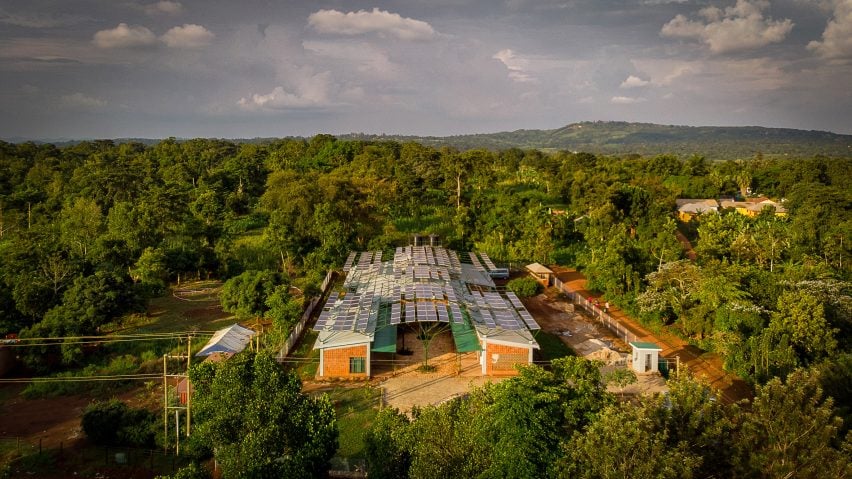The Mount Sinai Kyabirwa Surgical Facility in Uganda by Kliment Halsband Architects is a self-sustaining facility topped with solar panels.
Local labourers built the health facility using materials sourced from the area, including red bricks that form the perforated screen walls that allow for natural ventilation.
Red clay was dug up from sites near the building and fired to create bricks and cladding for the medical facility, a decision that also helped support the local economy.
"Surgical treatments are essential to building healthy communities worldwide," said Kliment Halsband Architects, which was founded in 1972 in New York.
"This model is built around developing an independent, self-sustaining facility capable of providing surgical treatments in resource-poor areas."
Kliment Halsband Architects took inspiration from the banana plants that grow in the area for the shape of the building, which is shaded by a canopy of solar panels.
"We thought of solar panels as leaves of banana plants gathering sun and providing shade," said the studio. The solar array shelters and powers the simple modular brick facility beneath."
The solar panels stand on a steel framework on the concrete roof, which is supported by another steel frame.
A hybrid battery storage system and onsite generator helps supplement the intermittent power available through the electricity grid. If the mains power fails, Mount Sinai Kyabirwa Surgical Facility can run off energy stored from the solar panels for two days.
Twenty miles of underground fibreoptic cable was installed to ensure the facility has a reliable internet connection.
Surgeons from the Mount Sinai Hospital in New York can help their counterparts in Uganda with live surgical consultations and video conference call in to operations in real time.
Gravity tanks store water from the well and the town supply, with a system that filters and sterilises it on demand. Roof water is collected and stored for using to flush toilets and water the vegetable garden, which provides food for the patients and staff.
Sewage is treated onsite by a septic tank, and an incinerator is used for the medical waste.
Air conditioning is used for the operating rooms, to keep them sealed and sterile. The rest of the Mount Sinai Kyabirwa Surgical Facility is ventilated naturally with air flow channelled by the undulating canopy and the perforated brick walls.
Uganda introduced free universal healthcare in 2001, but still struggles to provide for more rural populations. Architects are helping to try and improve this.
Renzo Piano is currently building a new children's hospital on the banks of Lake Victoria, and HKS Architects and Engineers for Overseas Development have also built a sustainable medical facility in Uganda, a maternity unit that can host new mothers and their families in a remote, underserved area.
Photography is by Will Boase unless otherwise stated.
Project credits:
Owner: Mount Sinai Health System New York
Architect: Kliment Halsband Architects
Project team: Frances Halsband, George K George, Simone Meeks, Max Marin
Structural engineer: Silman
Mechanical engineer: Keltron Development Services

